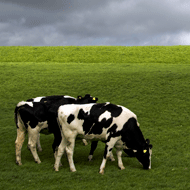E coli O157 prevalence to be investigated

Survey findings will inform the development of measures to reduce public health risk.
Scientists have undertaken a survey to find out how widespread E coli O157 is among finishing cattle. It is hoped their findings will help with developing measures to reduce the risk of human infection.
Verotoxigenic Escherichia coli (VTEC) O157 can be passed from cattle to humans through contaminated food or contact with cattle or their environment. In addition, it can remain infective in soil for months.
The new survey, beginning this month, will run until December 2015. It is part of a project by the Roslin Institute to find out why some cattle shed large amounts of O157 in their faeces, and to come up with strategies to reduce the human health risk.
Writing in the Veterinary Record (Vol 175, No 8), Madeleine Henry, Sue Tongue and George Gunn from Scotland's Rural College (SRUC), say they aim to find out the number of British farms with finishing cattle on which at least one animal is shedding O157.
Staff from SRUC and ADAS will visit a random selection of farms in England, Scotland and Wales to collect faecal pat samples. A farm management questionnaire will also be completed.
The Scottish E. coli Reference Laboratory will identify the more common phage types among cattle isolates, and more these to isolates from human cases to assess the role of cattle in human infection. Findings will inform the development of measures to reduce public health risk.
Participation in the survey is voluntary and confidentially will be maintained.
For further information, see the Veterinary Record, August 30, 2014, Vol 175 No 8, or contact Madeleine Henry at vetepidemiology@sruc.ac.uk or 01463 246072.



 The veterinary mental health charity Vetlife is inviting the veterinary community to join it for a sponsored cold-water dip.
The veterinary mental health charity Vetlife is inviting the veterinary community to join it for a sponsored cold-water dip.